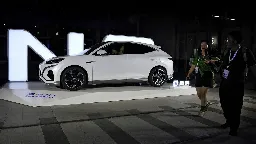EU approves steep tariffs on Chinese electric vehicles
EU approves steep tariffs on Chinese electric vehicles

EU approves steep tariffs on Chinese EVs, despite lack of majority

cross-posted from: https://feddit.org/post/3451147
European Union countries failed to agree on whether to slap China-made electric vehicles (EVs) with steeper tariffs during a closely watched vote that ended with too many abstentions, forcing the European Commission to overcome the political impasse and push its proposal over the finish line.
The outcome of Friday's vote was not publicly available, although several diplomats told Euronews how each member state positioned itself:
- 10 were in favour: Bulgaria, Denmark, Estonia, France, Ireland, Italy, Lithuania, Latvia, the Netherlands and Poland. (45.99% of the EU population)
- 12 abstained: Belgium, the Czech Republic, Greece, Spain, Croatia, Cyprus, Luxembourg, Austria, Portugal, Romania, Sweden and Finland. (31.36%)
- Five were against: Germany, Hungary, Malta, Slovenia and Slovakia. (22.65%)
The high number of abstentions reflects long-standing qualms about how Europe should stand up to China. Although the political consensus says that Beijing's unfair trade practices merit a forceful, united response, threats of commercial retaliation appear to have dampened the resolve of many capitals as the make-or-break date neared closer.
It was up to the Commission, which has exclusive powers to set the bloc's commercial policy, to break the gridlock and ensure the duties go through.


